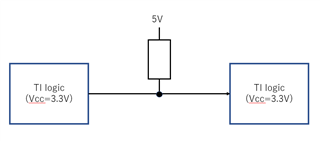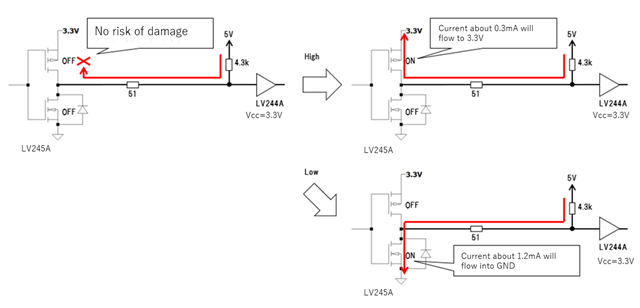Other Parts Discussed in Thread: SN74LV245A
Hi team,
is it OK to pull up listed logic device with 5V when Vcc=3.3V?

・SN74LV245APWR
・SN74LV244APWR
・SN74LV14APWR
・SN74LV07APWR
・SN74LVC244APWR
Regards,
Ohashi
This thread has been locked.
If you have a related question, please click the "Ask a related question" button in the top right corner. The newly created question will be automatically linked to this question.
Hi team,
is it OK to pull up listed logic device with 5V when Vcc=3.3V?

・SN74LV245APWR
・SN74LV244APWR
・SN74LV14APWR
・SN74LV07APWR
・SN74LVC244APWR
Regards,
Ohashi
See the recommended operating conditions (or the similar limits in the absolute maximum ratings):

When the output is active, the pull-up must not go higher than 3.3 V. Only when the output is disabled (with /OE) or powered off can you can go higher. (The '14 does not have an /OE input; the '07 has an open-drain output that is disabled when high.)
Hi Clemens,
Thanks for your support.

In the datasheet for SN74LV245A, it says AMR for Vo is Vcc+0.5 when the output is active.
For the sentence underlined, it means that Vcc+0.5V is limited to 5.5V, so in other words, Vcc is limited to 5V, right?
Also, below are the configuration that my customer is trying to do.

Sorry to confirm again. Since, AMR for Vo when active is Vcc+0.5=3.3+0.5=3.8V, the customer can't pull up with 5V like this, right?
In the datasheet of a similar device, it says that pulling up with 5V when Vcc=3.3V is not recommended. But it also says that pulling up with 5V won't damage the device. (Written in the Japanese version, nowhere in the english version)
https://www.renesas.com/us/en/document/oth/high-speed-cmos-logic-ic-hd74hc-series-outline
If the customer wants to pull up with 5V, would you reommend to use another device? (A device with open drain?)
Regards,
Ohashi
There are two limits on the active output voltage. The normal one is VCC + 0.5 V; the other limit of 5.5 V becomes applicable only if the supply voltage is above 5.0 V, which is usually not done. A supply voltage of 5.5 V would be allowed, with no margin. A supply voltage of 6.0 V would be possible, but then you would not be allowed to apply an external voltage to the output. (And the AMRs do not guarantee correct operation; see the recommended operating conditions for that.)
When you put a 5 V pull-up on a 3.3 V output, then a current will flow into the 3.3 V supply. This will not harm the device itself, but if the power supply and the devices connected to it cannot sink this current, then the supply voltage might float up. A device with open-drain outputs indeed would avoid this problem. (I guess it wouldn't be easier to change the pull-up voltage.)